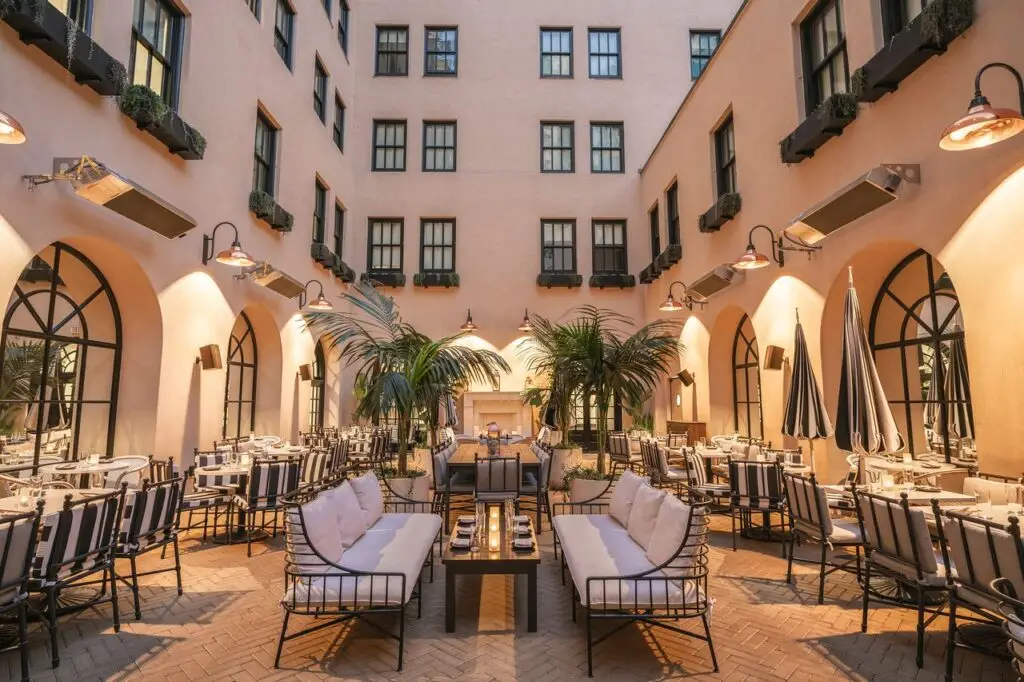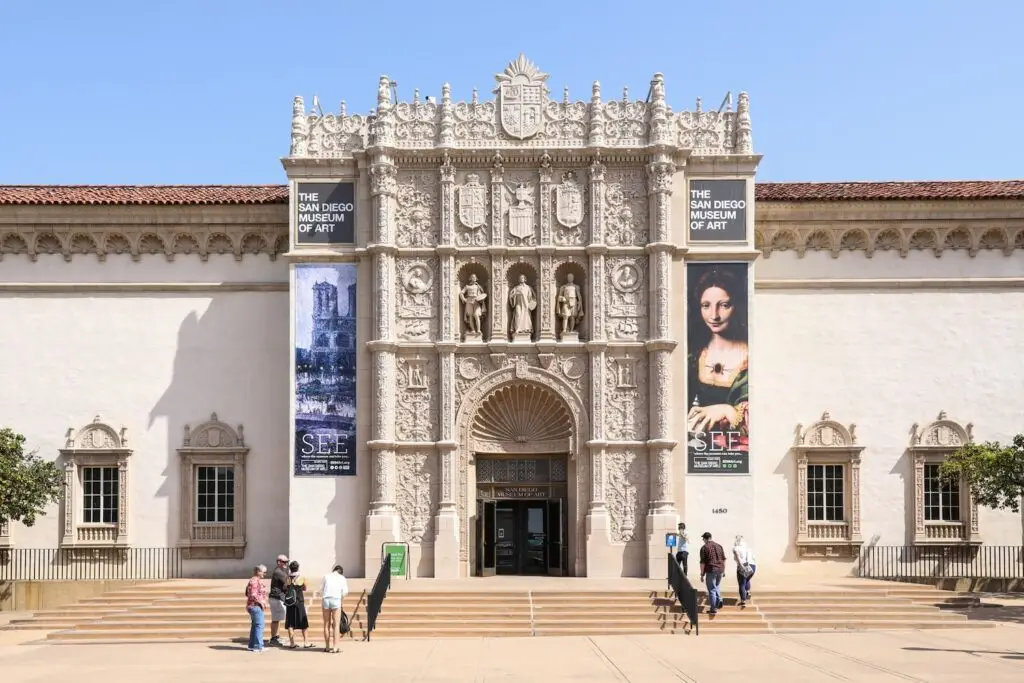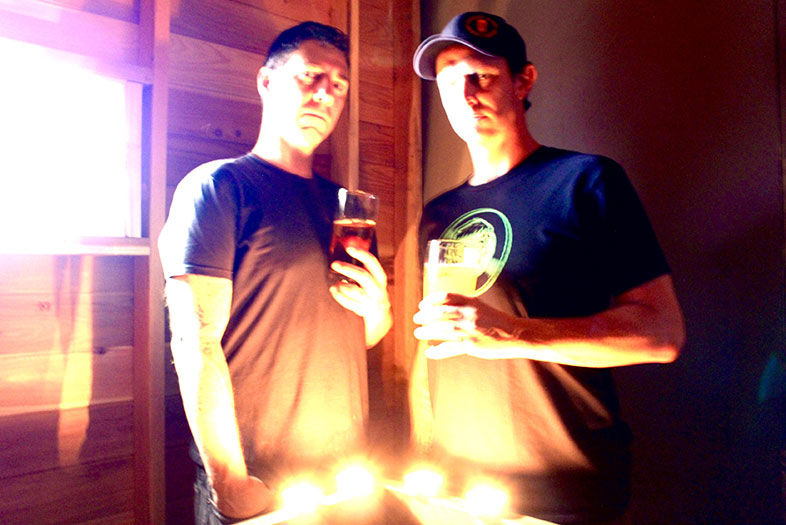Call it a mission. Call it a credo. Call it a movement. The guys who founded Burning Beard Brewing have a crystal-clear vision of what they want their company and their beers to be. Jeff Wiederkehr and Mike Maass are serious about having their brewery reflect their deepest passions for music, literature, painting, and anything else that requires the burning flame of creativity. Their scope is admirably wide; The Beard celebrates everything from Metallica to The Beatles, from Shakespeare to Ginsburg, from Van Gogh to Banksy. And, somewhere in there, they find the inspiration to create an impressive variety of super-tasty brews that meld the classic styles with just the right amount of mad genius.
It may have taken you a while to get it. Sure, Burning Beard is a curious choice for a name (didn’t you initially expect both founders to look like some version of ZZ Top?) and there’s a super-cool logo and kick-ass beers to go with it, so—for a while—you might have thought that’s all there is. But spend a little time on the website, hang out in the tasting room, and peruse the tap lineup—it’ll become clear: Burning Beard is the first San Diego brewery that’s really all about creativity—or the creative universe, to be more exact.
If you visit their website, you’ll find the answer to one question you’ve likely had: Where did the name come from? Here’s the quote:
Swan diving off the tongues of crippled giants, International Business Machine, Choking on bits of barley bread crumbs, Oh this burning beard I have come undone. It’s just as I’ve feared. I have, I have come undone.
Clutch, “Burning Beard”
Inspired by The Way of the Beard, I didn’t want this interview to follow the usual contours or pose the usual questions. Instead, I wanted to get Jeff and Mike to reveal the deeper truths about their endeavor, to describe the ethos that holds their place together. To my mind, that’s what makes Burning Beard such a truly rad deal.
Our discussion in the barrel room was lubricated by an awesome array of hop fuel; as we sipped on Circle of Hops pale ale, Hopmata IPA, and Gang of One S.M.A.S.H pale ale, each revealed a unique dimension of tropical, citrusy, piney, goodness. And the more we talked, the more it became clear: This brewery is more than just a place to quench your thirst, it’s a place to talk about ideas. So that’s what we did.
So, you know, I have a lot of standard questions that I typically ask brewers—and we can go over those if you want. But I thought this would be a good opportunity to go more “out of the box” and be a little more creative.
Jeff: We approve outside the box!
Good! All right. First things first: In my opinion, Burning Beard has become one of the coolest brands in San Diego. Are you guys feeling it? And remember, you don’t have to be humble.
Jeff: Well, if that’s the case, then f*ck yeah!
You’ve gotten a lot of love from a lot of folks in the brewing community—a lot of people whose opinions really matter—and if those guys give you their seal of approval, you know you’re doing something right.
Jeff: Yeah, we’re definitely feeling the love. Not too long ago we were having the conversation where we could not have imagined the success that we’ve been having—we would have settled for a whole lot less. But don’t tell anybody that!
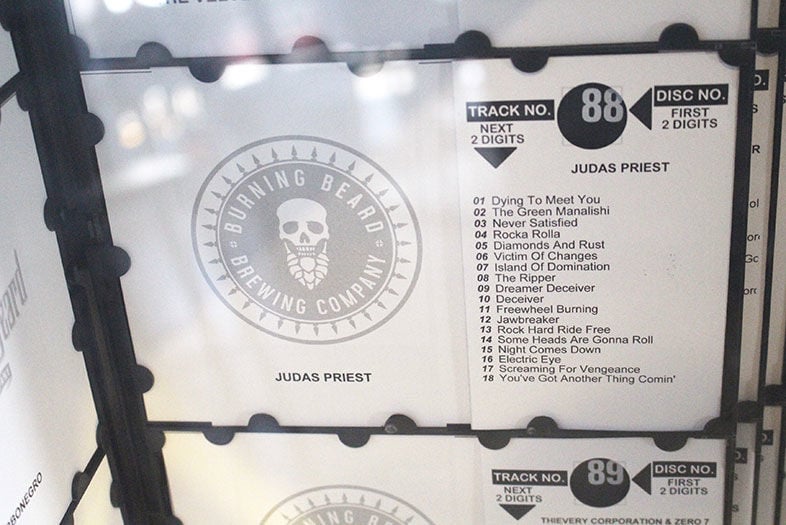
Have a Beer with Burning Beard Founders Mike Maass and Jeff Wiederkehr
The jukebox in the tasting room was refurbished and customized specially for the brewery. | Photo: Bruce Glassman
Given the creative identity of Burning Beard, how do you approach the development of the beers that you brew? Do you think about assembling them like a song, for example, or a recipe, or what? What’s some of the creative mojo that goes into the process?
Jeff: All of it, like everything else we do, starts out with what will ultimately be rolled out on June 1 with our “Distinguished Delinquents” program [more on that later]. Mike and I developed a persona that basically melds our personalities—we’re not the same guy and we don’t think exactly the same way on any topic, from what beers are the best to what music we want to listen to on a road trip. What we’re good at is respecting each other and compromising. We’ve created an “identity” that we named “Punkspeare” because it’s a blend of the punk rock ethos and Shakespeare. And that literally drives one hundred percent of everything we do here, from our approach to making beers to our approach to hiring staff in our tasting room, to how we protect our brand. It one hundred percent flows down from that.
Mike: I think there’s also an honesty behind what we do. A lot of what went into the development of our brand at the beginning was Jeff and me figuring out what a business looks like that we can put ourselves into one hundred percent. What’s something that we can stand behind. We believe if we’re building a business that’s going to be successful in the long term, it needs to be something we can believe in.
Jeff: Authenticity.
Mike: Yes. Authenticity.
It has to reflect who you really are as people—your interests, your passions…
Mike: Absolutely.
Jeff: And what we do with beer is not unlike what we do with the music that we listen to or the literature that we read, or what we do in our free time. We both have this love for traditional brands and traditional veins, and we also like to play with those. That probably answers your initial question a whole lot better. It’s why our tasting board looks the way it does. If you look at the beers the way we’ve broken them down, we have “post-modern,” “gothic,” “medieval,” and “transcendental.” Those are ways that we approach all of the artistic realms that we really dig. So all we did was apply that to beer.
Mike: And these are themes that have run through the literary and artistic world for centuries, right? It’s really all about re-appropriating those things. There’s a piece of copy on our website that alludes to the post-modern sense, and I don’t know how post-modern we are, but there’s a recombinant effect of repurposing those themes and I think that they apply. And I think the reason they resonate is that they’re proven out in the humanities and in the arts to resonate with people. And that’s something that inspires us and we like to bring that kind of thematic play to the way we’ve developed our beer and our brand.
To me, the Burning Beard brand feels a lot like a rock band of one kind or another. If the brewery were a band—and I know you two are into different kinds of music—what band would Burning Beard be?
Jeff: Man. That’s a tough one. I think we’d literally be—and maybe not in quality or in album sales—we’d be The Beatles, man!
Mike: That’s what I was going to say, too!
Jeff: Mike’s the Paul McCartney of Burning Beard. And maybe it’s just because I like to walk around naked with weird glasses on that I feel I’m the John Lennon, but we have this really cool interplay, there isn’t one of us that’s writing all of the songs, there isn’t one of us that’s directing the ship. We’re working on it together and that’s really what makes us better. We could have each started breweries independent of each other, but we couldn’t have made this brewery. It took both of us to do that. And that’s why Wings just wasn’t as good as The Beatles. And John Lennon’s solo stuff—Plastic Ono Band, man—not quite as good! So, we’re probably aiming our arrow at Sgt. Pepper’s Lonely Hearts Club Band (not the Andy Gibb version!); there’s lots of things going on and everybody’s contributing. I think that really speaks to how we created this brand, this brewery, and this Punkspeare space.
Mike: I like to think that we’ll be able to evolve our brand in a similar way to how The Beatles did. What I mean by that is The Beatles had a very clear identity when they started, and they gained a huge following and fanfare because of who they were, but they were able to evolve that and keep up the loyalty from their fans.
It’s interesting that you specifically mentioned Sgt. Pepper, because that was really one of the first rock albums to incorporate truly classical elements and truly avant-garde elements into a rock genre. There was orchestration, but there was also backward-running tapes, circus music, and sitars—a little bit of everything, which I think makes it a really apt comparison.
Jeff: Our traditional approach to beer is sort of like the root of that music, like blues, and there will be beers where we try to push the envelope, but there will be some where we’ll just try to run that blues line. So, yeah, there are tons of parallels with music. And we talk about it all the time that way.
Your influences are not only musical, though. There are lots of literary influences also. I wanted to get from you guys just where some of the names for some of the beers came from. Okay?
Jeff: Sure! See if you can stump us!
Wave of Phase Pale Ale?
Mike: Wave of Phase is a member of our hazy beer line, and early in the evolution of that beer line we thought that David Bowie could be a good inspiration for how we developed that line of beers.
Why David Bowie?
Mike: We both love Bowie—David Bowie was punk rock in his own right—but this was also around the time of his passing, so he was also on our minds.
Jeff: He defined his position in rock ‘n’ roll by first mastering the genre and then by repeatedly and successfully breaking free from the gravity of the genre. He had no fear. No limitations. He bent genders. He bent what was acceptable in music at the time. We came up with this naming scheme at a time when people in San Diego were not very high on anyone brewing a hazy IPA. And our philosophy pointed us to Bowie. [Specifically, the phrase “wave of phase” comes from Bowie’s Starman lyrics: Came back like a slow voice on a wave of phase/That weren’t no DJ, that was hazy cosmic jive.]
Dankness Visible IPA?
Jeff: It’s a play on Milton’s Paradise Lost. The original line is “darkness visible.”
Right. And was there a reason you went to Paradise Lost for that specific beer?
Mike: Early on we were going to do a stout called Darkness Visible and its counterpart was going to be more hoppy Dankness Visible. We dropped the Darkness Visible and just stuck with Dankness.
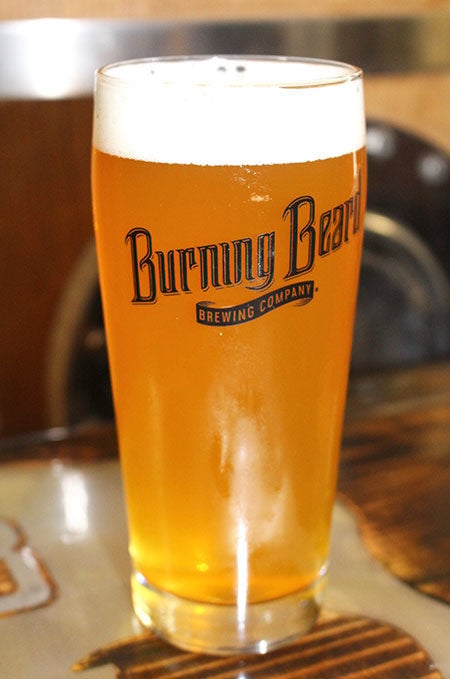
Have a Beer with Burning Beard Founders Mike Maass and Jeff Wiederkehr
Hopmata IPA is one of Burning Beard’s most popular beers. | Photo: Bruce Glassman
Hopmata IPA?
Jeff: The Stigmata! You bear the mark of the hop!
Mike: Put out your hands. Receive the Hopmata!
That is a great beer. Is this a beer you taste and have a religious experience from?
Jeff: More truthfully, we imagined that we would! A lot of these names came from homebrewing, when there’s a lot of down time. There were many late nights or driveway texting sessions between the two of us, and with that beer, we knew we wanted to make a beer that was representative of a stigmatic experience.
Normcore Pilsner?
Mike: Yeah, Normcore. That’s a fun one. Making normal hard-core again. You can search engine “normcore” and you’ll see it’s a cultural and fashion movement, it may have had its roots in the greater New York area, but it’s kind of become a thing. For us, the pilsner is kind of the normcore of beers. It gets back to a simplicity—a simpler approach and kind of being un-flashy for the sake of quality; getting to root of what’s more important.
Is it also that maybe it’s so un-cool that it’s cool?
Jeff: Absolutely. Yes. For example, I just went to this show, I saw the Murder City Devils at the Irenic, that church in North Park behind the Von’s [close to] where Ritual used to be. They’re alternative, kind of like cross-over alternative-punk-rock, and the singer came out wearing dad jeans, a woven belt, and a polo shirt. He is normcore. And that’s what we were trying to do when we were coming up with a name for our pilsner—this was during the pre-Mexican lager phase, before everybody was all high on the Mexican lager again—and the only people in San Diego that really had a pilsner to speak of were Societe, Fall, and of course Doug Hasker at Gordon Biersch. It was one of those things we wanted to open the door with and wanted to make a statement with, and the name is part of that statement.
Mike: It’s a statement within an understatement. Right? It’s anti-fashion. And it’s become one of our most popular beers.
Roggen the Lightning. That’s a continuation of the Rye the Lightning idea, right?
Jeff: Yeah. The paltry rye content of Rye the Lightning compared to the 80% rye in Roggen the Lightning—it’s just another play on words. One day I wondered, what if we actually did a roggenbier and amped up this recipe and went crazy with rye. So, that is all it is.
And Rye the Lightning, just to be clear, the origin of that is…
Mike: A spinoff of a Metallica album, Ride the Lightning.
Ok. Get Thee to a Nunnery. Mr. Shakespeare, you want to comment on that?
Mike: Shakespeare, yes. Quoth Hamlet to Ophelia.
But what was it about that particular beer that made you feel that was the name to go with?
Jeff: Man, that’s a deep question.
Mike: That is a deep question. Honestly, I think it was a matter of going through the long list on the spreadsheet and finding a name that hadn’t been used yet that was really awesome!
Jeff: Also, Mike and I both love Shakespeare (both with advanced lit degrees) and Belgian beers. The nunnery line is a twist on the obvious “monastery,” which actually rears its head as our Belgian-style Dubble: Get Thee to a Monastery. We went big picture with this naming scheme.
Holy the Void Oatmeal Stout?
Jeff: It’s a play on a line from Ginsburg’s Footnote to Howl: “Holy the mysterious rivers of tears under the streets! […] holy the abyss!” is the line. It’s a part of it where Ginsburg just goes on this rant about how everything is blessed. And everything is holy.
Mike: There was a trademark issue with using the term exactly.
And I assume this name came about because this beer is deep and dark and kind of like a black hole, am I right?
Jeff: Indeed! And Holy the Void is also evocative of a great Spinal Tap scene where Nigel Tufnel ponders the depth of the all-black album cover. “There’s something about this that’s so black, it’s like how much more black could this be? And the answer is none. None more black.”
All right. Banksy ESB. I’ll give this one a shot and you tell me if I’m right, okay?
Mike: Go for it.
ESB is a style that not a lot of people do; it’s kind of like under the radar…
Jeff: People hate it before they know it.
Yeah, but when you taste it, you realize it’s really frickin’ good, and in that way it’s a little rebellious the way Banksy is, and kind of anonymous the way Banksy is, in terms of the way people think of the style, but when you get to know it you realize how cool it is.
Mike: I think you pretty much nailed it. Also, Banksy is rumored to be a person or persons, nobody really knows, from Great Britain. There’s a mystery there. There’s also a simplicity to Banksy’s art, right? He’s a stencil artist. There’s something very simple but also very poignant behind what he’s doing. And I think that’s the same for this style of beer, the way that we’ve interpreted it.
I wanted to ask you about a couple of other things that are a key part of the Burning Beard identity. One of your main descriptors is, “It’s punk rock to the core.” Tell me about that.
Mike: This goes back to the very early days of sitting in the driveway homebrewing beer, where Jeff and I would be spitballing ideas and seeing where our visions for a potential brewery could overlap. And that’s where the overlap in our personal interest is—it’s in this notion of “punk rock to the core.”
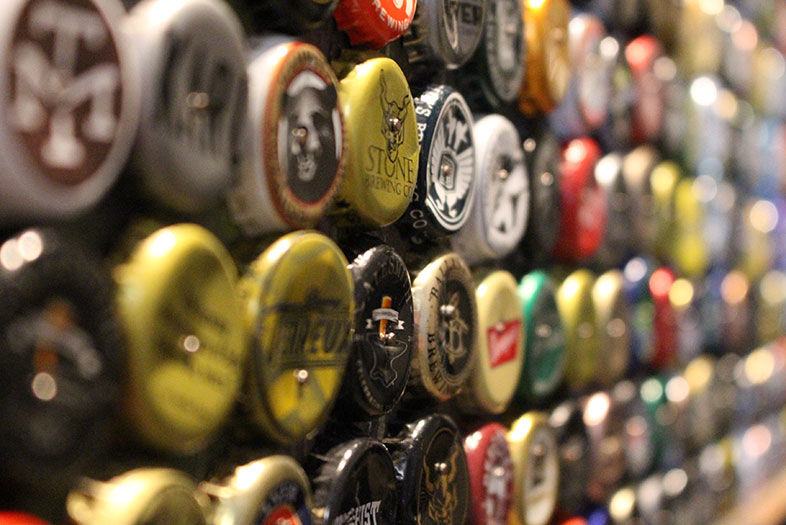
Have a Beer with Burning Beard Founders Mike Maass and Jeff Wiederkehr
A bottle cap installation created by Mike and Jeff is one of many visual features in the tasting room. | Photo: Bruce Glassman
It’s a genre that you both share an affinity for?
Mike: Yeah, but it’s deeper than that. We’ve talked about Shakespeare, we’ve talked about David Bowie, we’ve talked about The Beatles; all these people are acting on a creative impulse and pushing the envelope in their own way, and that’s at the root of the punk rock ethos, for us. How do we embody that, in what we’re doing here, to do something that’s just honest and straightforward?
Jeff: On the fateful night on which the theory of The Beard was conceived (2012) I had been lamenting the fact that I could not start a band with Mike—he doesn’t play a musical instrument!—so the idea became let’s brew beer together. At the heart if it, no matter what we would have done together, that’s just who we are. And we’re not trying to position ourselves above anybody, we’re just trying to be ourselves. Life is too complicated when you’re inauthentic. So we found this really cool space that we get to share—the beer, the brewery, Punkspeare, Burning Beard—it’s all an expression of us. And that idea, that notion of the punk rock ethos, is about just doing what you want to do and not worrying what your neighbors or your parents think about it. You just have to be yourself. This place gives us that opportunity.
Another key descriptor you guys use for Burning Beard is “subversive.” Tell me how you’re subversive.
Jeff: It all comes from the Beard ethos. Much like Bowie or The Beatles were “subversive” to rock n’ roll, we respect tradition, but more importantly, we respect the creative muse. Also, we aren’t in this for the money, and when one is not in the game for money, one becomes dangerous, wild, uncontrollable. And that’s what we are. No one owns us and that makes us dangerous. At the core, we are in this for our sanity, so that we’d have a creative outlet, and so we could create our own band of like-minded people. In that way, we are like the Fight Club of breweries. For one reason or another, all of us here at The Beard were looking for a connection to something larger than ourselves, we just exchanged soap for beer.
Mike: There’s also a subversive spirit in the way we go big and do it right. It’s interpretive. And it’s more of a mindset than something you would see. When you think about the Burning Beard and the interpretation of what that means, there’s always a subversive underpinning to an artistic expression. That’s what makes good art. We’ve talked about music and art and literature—those are the things that inspire us and that’s the creative fire that the burning in the Burning Beard represents. Not everything that we do will appear subversive, but we draw inspiration from those creative people who have been subversive.
You mentioned the Distinguished Delinquents before. Tell me more about that.
Mike: Distinguished Delinquents is a membership club, being launched on June 1. It’s the real-world, three-dimensional embodiment of this Punkspeare character we speak about. It’s targeted at bringing together like-minded folks who enjoy sitting and talking and telling stories and jokes and drinking beer. That’s the underlying force behind this new program.
Jeff: It’s sort of a back-room extension of what we designed our tasting room to be, with more access. We’re going to invite club members to be part of the conversations with both of us.
Mike: It’s about storytelling. And there are club member benefits; you’ll get a 20-ounce stein, you’ll get discounted beer in the tasting room, other special discounts and benefits, like a grumbler you can fill, and some of our special packaged beers. But really it’s about bringing our most loyal and dedicated customers into the story.
And how will members join?
Mike: It’s an annual membership. It’ll open up on June 1 and people can go to our website to check out all the details.
Before we close this interview out, Mike, would you like to recite for our readers the Four Tenets of The Beard?
Mike: Sure. “Live Creatively,” that’s the first one.
Jeff: And the important thing about that is this: Mike and I literally cashed in and sold everything to open this business. And it was because living creatively means a lot to us and feeling connected to what we do is important. So we jumped at an opportunity to create this.
“Love Thy Neighbor” is one of the tenets. That’s an interesting one to have on there.
Mike: It’s the golden rule, man.
Jeff: And it’s what this space is about.
Mike: Jeff and I did a lot of exploratory research before we opened this business. And part of that was to get a real feel for what the customer experience felt like at a bunch of places. And we asked a lot of questions—questions we knew the answers to—just to see how the bar staff would treat us. We came to the understanding that a good customer experience is often overlooked in this industry. There are a lot of breweries in this town that do a great job with it, and there are others—and other bars—that do a terrible job at it. We wanted to make sure that this was a place where anybody with any level of experience with beer could come and feel welcomed.
Jeff: I really believe this tenet is reflective of us and what we believe. Our personal ethos. How we operate in daily life. It’s how we operate with family and friends and our own neighbors, and this place is supposed to be an extension of that. That’s why we opened it. It’s where we want to be with people we want to be with. Everyone we hire is a reflection of that, and how they treat our customers is part of that. So this tenet is one of those authentic ties to who we are.
And isn’t making great beer a good way to love your neighbor?
Jeff: Absolutely!
“Go Big and Do It Right” is the next tenet.
Jeff: That one’s easy.
Mike: Just look around. There are a lot of barrels in this room!
Jeff: We did the business plans on smaller systems, but we could not do what we wanted to do on a three-barrel system. We did not open this place to fail, we opened this place to succeed. So, we opened way bigger than we should have—we’re probably still bigger than we should be—but we know our system and there won’t be any growing pains. We’re able to service our tasting room and our growing distribution base. We went big with equipment, we went big with staff, and we’re going big with our beers.
And you’re “Sparing No Expense,” which is the fourth tenet.
Jeff: We are sparing no expense.
Mike: Sparing no expense to make great beer!
Follow Bruce on Instagram: @sdbrewdude
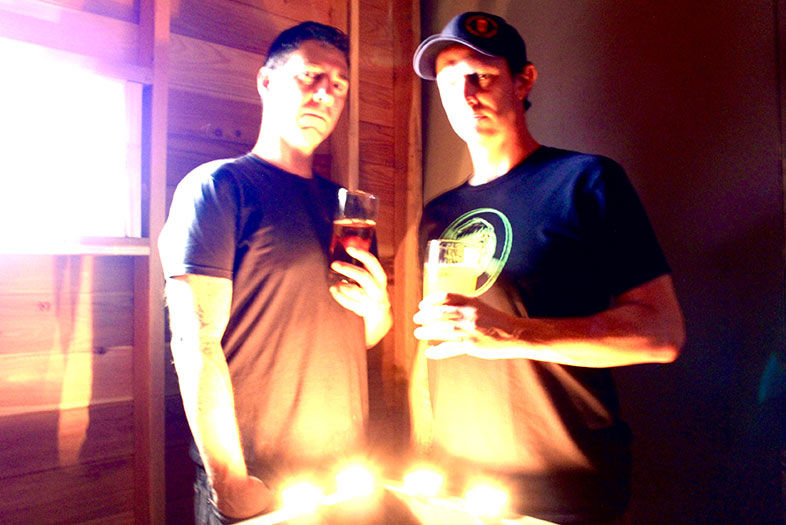
Have a Beer with Burning Beard Founders Mike Maass and Jeff Wiederkehr
PARTNER CONTENT
Burning Beard founders Jeff Wiederkehr and Mike Maass take their inspiration from the arts. | Photo: Bruce Glassman

